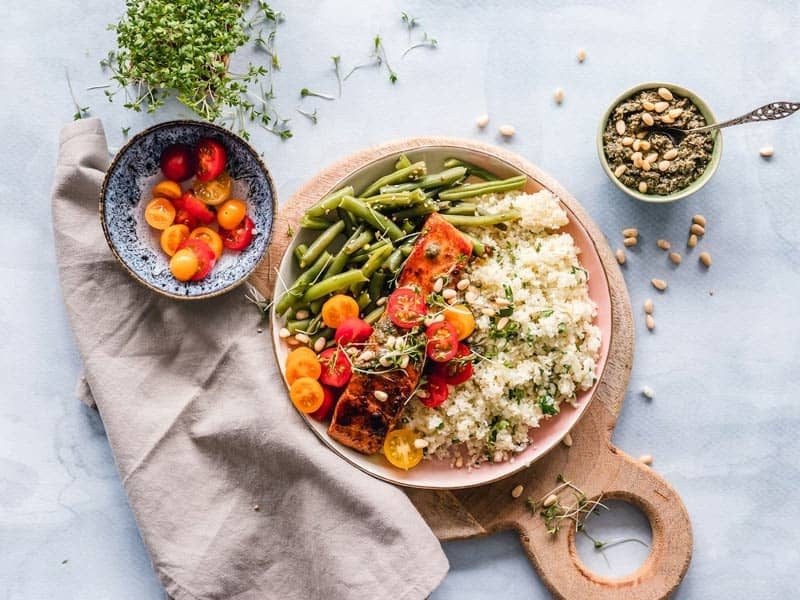Here are 10 healthy eating habits to help you kickstart an all-round healthy style of living.
Listen to your body
Stop! Listen. The first step to getting anywhere is making it a conscious point to listen to you body. Your body is the vessel to carry you through life and understanding and respecting its needs is the first step to walking a path of all-round wellness and health. Our bodies never stop giving us signals of what we’re doing right or wrong. Making the choice to actively listen to those needs and tuning in where necessary in turn helps us better than you’d think. Laying a foundation for your own health and wellbeing is a crucial initial step. A healthy body feeds a healthy mind and ignoring vitals signals means stunting the growth of a healthy lifestyle.
Don’t starve yourself
Eating is important. Good health starts with a good gut. The key here is eating food that is high in nutrition without compromising on the energy levels. The best way to finding out what will work best for you, is understanding what your body needs in this point in time, as well as in the long term. Some diets like the Ayurvedic diet will assess your principle dosha, or body type, and help target the kinds of foods best suited to your body in order to help achieve optimal levels of health and wellness in both the long and short term.
Adopt a healthy living diet
While adopting a cohesive wellness cuisine is one of the most vital steps to achieving an overall healthy lifestyle, making those necessary changes to your diet can be hard without some kind of guide. That’s where adapting a well-established diet comes in to play. Don’t compromise on the value of eating regularly, or even the quality of meals. Instead, speaking to a nutritionist to pinpoint the kind of diet best suited to your body and its needs can help work wonders. Low-carb diets like the ketogenic diet and the detox diet provide well-rounded approaches to eating healthily in a multitude of ways for a short, regulated period of time.
Don’t skip the fats
While it may be tempting to cut fat out of your diet completely, skipping fats in meals is actually counterproductive. Small amounts of fat are an indispensable part of a balanced diet and should not be eradicated entirely. Fat are necessary to help the body absorb vital nutrients like vitamins A, D, and E. Not to mention, not eating enough fats can induce a number of negative side effects, like constant hunger, and an over-indulgence in other more harmful foods such as an excess of sugar. Stick to food abundant in monosaturated fattty acids (or MUFAs), themselves abundant in a list of potential health benefits like weight loss, reduced risk of heart disease and decreased inflammation. Food such olive oil, pumpkin and sunflower seeds, eggs, and several kinds of nuts, like cashews, almonds, and peanuts, are all rich in essential monosaturated fatty acids.
Be conscious of your salt intake
Common table salt is packed with a bunch of necessary minerals for body functions. Not only is it a convenient source of iodine, a trace mineral found in seafood and dairy products like eggs necessary for regular thyroid functions, the human body itself require a small amount of sodium to conduct nerve impulses, muscle contractions and relaxations, as well as to maintain the proper balance of water and minerals. But too much of a good thing can play a harmful tune too! While salt is an important part of a healthy diet, an excess can lead to high blood pressure and heart disease. Therefore, it’s important to maintain a balance between excess and necessity, although cutting salt entirely from one’s diet isn’t a required step at all.
Go easy on the processed foods
While it may be easy to indulge in a quick take out meal, studies have proven that the long term health effect of indulging in an excess of ultra-processed foods does not bode well for long-term health and an overall healthy lifestyle. Cutting back on the habit and instead making more of a point to indulge in more minimally processed foods or freshly made meals can have a great impact on one’s overall health and lifestyle.
Eating seasonally and locally
Seasonal and homegrown vegetables and fruits are not only guaranteed to be fresh, it is also an extremely cost efficient practice- doubly beneficial for how environmentally friendly it is! Without the added fuel expense required to transport produce over long distances, we help slow down humanity’s carbon footprint, albeit in a tiny way.
Making conscious choices about drinking habits
While there are plenty of correlational benefits to moderate drinking, the practice itself- as with anything- can take a significant negative toll on one’s overall health when indulged in excess. When it comes to taking conscious steps towards to a healthier lifestyle, assessing those old habits that might not be reaping any personal benefit is just as important. Listening and respecting one’s body and noting its responses becomes a health practice that benefits from the inside out.
Hydrate, hydrate, hydrate!
While talking about the foods and the food practices we engage with, the importance of water and proper hydration should not be forgotten. Water is necessary for the body to naturally flush out toxins from the body, as well as aid in digestion and prevent dehydration. Keep track of your water intake and make sure you’re hydrating consistently and often throughout the day.
Eat what makes you feel good
At the end of the day, eating is something we do, not just for survival, but also for pleasure. After all, humans are the only species that cook their food before consuming it. Enjoy what you eat and before you know it, you might just find yourself already well on the path to an overall healthy lifestyle!


